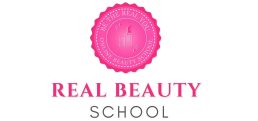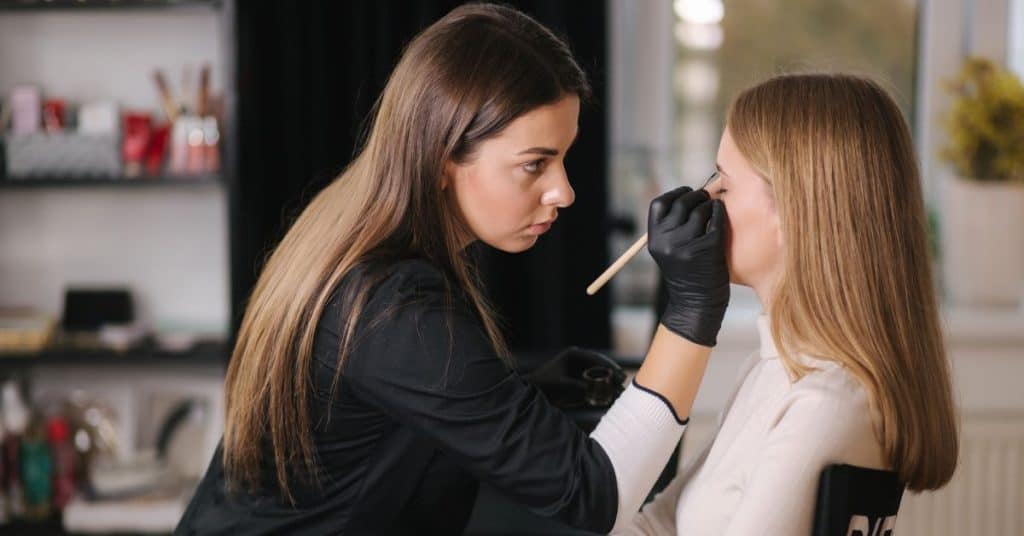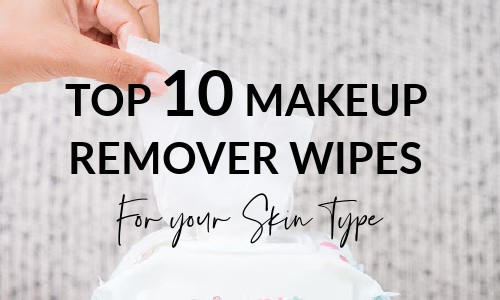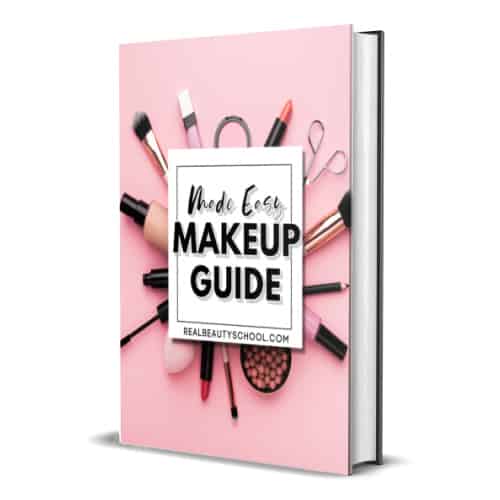What is a Makeup Artist? (and What Do They Do?)

Valeria H. is Real Beauty School’s Senior Beauty Editor and the instructor behind our makeup lessons. She’s passionate about sharing beauty tips, trends, and tutorials for newbies. She’s an experienced makeup artist and also the author of the popular makeup book, “Makeup Made Easy” and when she’s not crafting the perfect makeup tutorial or diving deep into the latest beauty trends, you can find her enjoying her favorite latte with a cozy blanket and watching Netflix
A Makeup Artist is a person that applies makeup professionally for people. It could be for a special event, TV, or social events like weddings, prom, and also some offer private services for Hollywood stars or singers.
A Makueup Artist or a MUA, as more commonly known, is an artist that provides, combine, matches, and applies makeup for a specific client at a determined event or occasion.
The Makeup Artist can be a certified or licensed cosmetologist or esthetician, but this is not necessary in most states in the US.
So basically, anyone that applies makeup professionally for other people (with or without a license) is a makeup artist.
What is a Freelance Makeup Artist?
The term freelance often refers to entrepreneurs who work for themselves rather than for a company.
So, a freelance Makeup Artist is someone that applies makeup professionally as a business without necessarily being employed by a salon or business.
Some Makeup Artists have their own beauty studio/salon where they do makeup professionally. Some work at a Salon/Studio as employees or contractors, which usually means the commission or they pay their place on the salon or rent.
Nowadays, a Makeup Artist doesn’t need to work for a salon to be known and find clients.
With social media, especially talking about Instagram and facebook, a freelance makeup artist can make their living by finding clients online and going to the client’s houses/venues to do the job.
Some also use their house as their workplace, where they do makeup for clients.
NOTE: Doing makeup in most US states is allowed without a license, but as a makeup artist, you can not do hair. If you are a makeup artist trying to offer makeup and hair, you’ll need a cosmetologist and esthetician license, depending on your state.
What Are Makeup Artists Called?
Makeup artists often have various titles based on their expertise and the niche they operate in. They can be known as cosmetologists, beauty technicians, or estheticians.
Specialized makeup artists working in the entertainment industry might be dubbed theatrical or film makeup artists.
Then, some specialize in special effects or ‘SFX’ makeup, aptly named special effects makeup artists.
But most commonly, you can hear the term MUA.
What is a MUA?
MUA is the acronym for Makeup Artist.
And that’s a term commonly used in the beauty industry to refer to professional makeup artists.
What Do You Do as a Makeup Artist?
A makeup artist does more than just apply cosmetics.
They:
- Consult: Before anything, a makeup artist discusses the look that the client or project demands. This could range from a bride’s vision for her wedding day to a director’s specific requirements for a film character.
- Prepare the Skin: A makeup artist cleanses and moisturizes the skin to ensure smooth makeup application. So some skincare knowledge is important in a MUA. That’s why when you can totally be a self-though Makeup Artist, professional education is strongly advised.
- Apply Makeup: Using a variety of tools, they create the desired look. This could be a natural, evening, or a more dramatic look, depending on the occasion. And the Makeup Artist needs to know what are the best products tu use for each client, what are the best tools to apply those products and find, match and combina the shades, tones, and colors to create harmonious makeup for that client.
- Educate Clients: Many makeup artists offer tips and tricks to clients, guiding them on daily makeup application and skincare routines. Some Makeup artists (like me) love teaching and offer, consultation, coaching sessions, courses or like me: Makeup Manuals, guides and books.
- Stay Updated: The beauty industry constantly evolves. Makeup artists must continued study and gstay updated with the latest trends, techniques, and products.
Can Makeup Artists Make Good Money?
Yes, absolutely.
Like any profession, a makeup artist’s earnings often reflect their skills, experience, and location.
While entry-level makeup artists might earn a modest income, those with a good clientele, specialization, or industry reputation can make a handsome sum.
How Much Does the Highest Paid Makeup Artist Make?
Top-tier makeup artists can earn staggering amounts, especially those working with celebrities or on high-budget film sets.
Based on Indeed, Makeup Artists in the United States make around $26/hour.
This is obviously only an average and it doesn’t reflect the actual income of a MUA. It all depends on the location, experience and agenda.
Renowned makeup artists could rake in anywhere from $100,000 to $300,000 annually, or even more.
Celebrity makeup artists often benefit from brand endorsements, personal product lines, and other lucrative deals that can significantly augment their income.
How much can a NEW makeup Artist make?
Let’s calculate how much you can make as a NEW Makeup Artist
, and let’s do this based on a freelance makeup artist, not one hired by a salon with a salary.
So let’s say you have your makeup kit already (that would be counted as expenses, but let’s not get into details for that)
You just got your Makeup certificate, you are ready to get your first client, and you found it by the Facebook marketplace.
Let’s assume you have already practiced enough for you to have a photo portfolio. That’s why you got your first clients and the confidence to do makeup professionally for clients.
Your first client. It’s a girl who needs makeup for a wedding.
She is a wedding guest, and she and her mom hired you to go to their house for their makeup on the wedding day.
As a new makeup artist, you could charge something between $35 (on the lower end) and $150 (on the higher end) for each makeup application.
AND
because you are traveling to their house, you could charge an extra $50 for that or more (depending on the distance)
So let’s do an average of $90 per makeup session, plus the $50 for traveling.
Since you only travel to one place, you charge the $50 once.
So that’s a total of $220 for your first two clients.
Let’s calculate how much that is per hour.
So the travel was about 30 minutes, so it’s an hour in total.
Plus 50 min in each makeup.
(some do makeup in 30 minutes, some do makeup in 1 hour or even 2 hours, so that would change drastically how much you can make per hour, depending on how much time it takes you, but I have found that 45 to 1 hour is a reasonable estimated time)
in time, that is almost three hours.
So, $220/3 hours is $73 per hour.
That sounds pretty good, ah?
But that would be only INCOME. Not profit.
We still would have to count the expenses, which were transportation, products used, and more things like taxes etc.
But that (accounting) is NOT our area of expertise, so we’ll just leave that to your personal accountant.
Please note: The figures provided are for informational purposes only and do not guarantee or reflect the results you may achieve. For professional financial advice, consult your CPA or business advisor
Working as a freelancer is not easy, but for some, it is worthy it.
At least for me, it is. And I know it is for many more.
Is Makeup Artist a Stressful Job?
Every job has its stresses, and being a makeup artist is no exception.
But I should say it also relaxing.
I love makeup, and I find being a makeup artist joyful, enjoyable and, like I said, relaxing, but it also brings some grade of accomplishment when you finish your makeup session and see the results on your clients that I know for sure, that most jobs don’t have.
So stressful? It can be. Because you are dealing with people that think, feel, and are humans just like you, and problems can happen like in any other job.
But I would not describe it with that word.
MUAs often work under tight schedules, manage client expectations, and might have to stand for extended periods.
Additionally, the pressure to deliver perfection every time can be overwhelming but, as I mentioned, also rewarding.
What Are the Negatives of Being a Makeup Artist?
Unlike many other job, I don’t have an extensive list of negatives of being a makeup artist. But I also like to show the whole picture of the job, so I want to show you both the positive and negative.
- Unpredictable Hours: The hours can be long and erratic, especially for freelancers. If a client needs an early makeup session before 7 a.m., you’ll do it. If a client or clients need you on Fridays or Saturdays (when there are usually more events), you’ll need to be there those days.
- Physical Demands: Standing for extended hours, precision, and repetitive motions. Well, that’s also true for so many low-paying jobs, but standing while I do art with makeup is not as bad as it sounds. But I see how It could be a problem for people with back pain or related.
- Client Pressure: Managing expectations and sometimes handling unhappy clients can be challenging. It is also a good skill to acquire.
- Competition: The beauty industry is competitive, and standing out requires effort, skill, and marketing. However, because this is a job based on art and style, there’s always a way to stand out from the competition.
How Can I Start Doing Makeup for Money?
If you’re looking to venture into the world of makeup, here are some steps to guide you:
- Educate Yourself: Consider enrolling in a professional makeup school or course. Here’ at real beauty school, we offer an online program. It is not always open, you can join the waitlist here
- Practice: Begin with friends and family. Build a portfolio showcasing your work.
- Get Licensed: Some regions require makeup artists to be licensed, so check local regulations.
- Build Your Kit: Invest in high-quality makeup products and tools. I said high-quality, NOT necessarily high-end or expensive. I said high-quality. Which is not the same. I explain more about drugstore makeup vs luxury makeup in this post.
- Network: Join makeup artist communities, attend beauty conventions, or collaborate with photographers and models.
- Set Your Rates: Research the market rates in your area and price your services competitively.
- Promote: Create a strong online presence via a website, social media, and other platforms.
In conclusion, makeup artists are more than just individuals who apply cosmetics; they’re artists in the truest sense.
Whether you’re looking to hire one or become one, understanding the depth and breadth of the profession can lead to a richer, more fulfilling experience.
What jobs can you get as a makeup artist?
- Celebrity Makeup Artist: This role involves working with movie stars, musicians, and other public figures to ensure they look their best for public appearances, red-carpet events, and film roles. Building a strong portfolio and networking are crucial to landing a celebrity clientele.
- Theatrical Makeup Artists: These artists work in the theater industry, helping actors transform into their characters for the stage. This often requires creating period-specific looks or aiding in storytelling through the character’s appearance.
- Runway Makeup Artist: Tasked with creating looks that complement fashion designers’ collections on the runway, these artists must be able to work under pressure, understand fashion trends, and collaborate with designers and models.
- Bridal Makeup Artist: A wedding day is one of the most important days in many people’s lives, and brides often hire makeup artists to help them look their best. This role requires understanding of long-lasting makeup techniques and the ability to create looks that both photograph well and satisfy the bride’s preferences.
- Beauty Writer/Editor: Drawing on their expertise, some makeup artists choose to write for magazines, blogs, or other media. This role is perfect for those who have a passion for both writing and makeup, and wish to educate or advise the public on the latest trends, products, and techniques.
- Freelance Makeup Artist: These professionals often run their own businesses and take on a variety of clients and projects, from personal makeovers to corporate events. Being a freelancer requires a combination of makeup skills and entrepreneurial acumen.
- Special FX Makeup Artist: Working mainly in the film and television industry, these artists create effects that simulate injuries, age, monsters, and more. It’s a niche within the makeup world that requires a blend of artistic talent and technical skill, often involving prosthetics and other materials.
Each of these roles within the makeup artist profession offers unique challenges and rewards, and the best fit will depend on an individual’s passions, skills, and career goals.
A Typical work day of a Freelance makeup artist… & Beauty Editor

Here’s how my day as a makeup artist and beauty editor at Real Beauty School usually goes:
I wake up and do my usual stuff in the morning, like checking what’s on for the day. If there’s no rush, I chill a bit, drink my coffee, and maybe listen to some music.
When it’s time for makeup appointments, I chat with my clients to figure out what they want. For brides, it’s about making their dream look come true. For photoshoots, I team up with photographers to get the look just right. Sometimes, I also teach people how to do their makeup.
Lunch? It’s usually quick, grabbed between two clients. But the best part is seeing my clients smile when they see how they look. It’s pure magic!
When the day starts wrapping up, I clean my tools and restock my supplies. Oh, and sometimes I shop online for new makeup stuff. As for my role at Real Beauty School, I spend some time writing about the latest in beauty and sharing my experiences.
By bedtime, I think about all the fun chats, the stories, and the makeup magic we made. Makes all the hustle worth it!
Example of a busy work day of a makeup artist:
| Time | Activity |
|---|---|
| 6:00 am | Wake up, morning routine |
| 6:30 am | Quick breakfast & coffee |
| 7:00 am | Review day’s appointments and prepare makeup kit |
| 8:00 am | First client: Makeup session for an early photoshoot |
| 10:00 am | Second client: Consultation and makeup trial for wedding |
| 11:30 am | Quick lunch break |
| 12:00 pm | Write an article draft for Real Beauty School |
| 1:00 pm | Third client: Makeup for an afternoon event |
| 2:30 pm | Fourth client: Evening look makeup session |
| 4:00 pm | Teach a makeup class or workshop |
| 5:30 pm | Short break & snack |
| 6:00 pm | Fifth client: Night out or special occasion makeup |
| 7:30 pm | Clean, sanitize and restock makeup tools and products |
| 8:00 pm | Research & online shopping for new makeup products |
| 9:00 pm | Continue article for Real Beauty School or plan for next one |
| 10:00 pm | Wind down, relax, and prepare for the next day |
| 11:00 pm | Sleep |
The calendar I laid out for you? It paints the picture of one of my busier days.
But here’s the thing: not every makeup artist has a day like that, and to be honest, neither do I all the time.
I’ve leaned more towards the teaching side of professional makeup.
With my focus now on education and the online makeup program I offer at Real Beauty School, my current days can look quite different.
The world of makeup is as varied as the colors in a palette.
While some days are packed end-to-end for me, other days are more relaxed and centered on teaching.
So, this glimpse is just one shade of my experience, but it doesn’t show the whole spectrum of my life as a makeup artist and educator.
Final thoguths
While I was trying to describe the role of a makeup artist, I have to say that a MUA do more than just apply makeup; they tell stories, enhance natural beauty, and often, help individuals feel more confident in their own skin.
As we’ve explored, one can pursue several specialized paths within this profession, each with its own set of challenges and rewards.
If you’re considering a career in this field, finding the niche that resonates most with your interests and strengths is essential.
Remember, every makeup artist starts with a brush and a vision—it’s where you take it that defines your journey.
More questions? Send us an email at [email protected]



